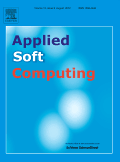
APPLIED SOFT COMPUTING
Scope & Guideline
Connecting ideas and applications in soft computing.
Introduction
Aims and Scopes
- Soft Computing Techniques:
The journal emphasizes the development and application of soft computing techniques including fuzzy logic, neural networks, evolutionary algorithms, and swarm intelligence. - Interdisciplinary Applications:
Research published spans multiple disciplines, showcasing the versatility of soft computing in fields such as healthcare, finance, engineering, and environmental science. - Real-World Problem Solving:
The focus is on practical applications that address real-world problems, demonstrating the effectiveness of soft computing methods in solving complex, uncertain, or imprecise issues. - Innovative Hybrid Approaches:
The journal encourages innovative hybrid methodologies that combine different soft computing techniques to enhance performance and applicability in various scenarios. - Benchmarking and Comparative Studies:
It also promotes studies that benchmark soft computing methods against traditional approaches, highlighting their advantages in specific contexts.
Trending and Emerging
- Deep Learning Integration:
There is a significant increase in research that integrates deep learning with soft computing techniques, particularly in applications like image recognition, natural language processing, and time series forecasting. - Hybrid Models and Algorithms:
The trend towards developing hybrid models that combine various soft computing techniques with traditional algorithms is gaining momentum, showcasing enhanced performance in complex problem-solving. - Sustainability and Environmental Applications:
Research focused on sustainability, including energy management, resource allocation, and environmental monitoring, is increasingly prevalent, indicating a broader societal shift towards ecological concerns. - Healthcare Innovations:
The application of soft computing in healthcare, including diagnostics, patient monitoring, and treatment optimization, has seen a notable rise, reflecting the growing intersection of technology and health. - Real-Time and Adaptive Systems:
Emerging trends include the development of real-time adaptive systems that utilize soft computing for dynamic decision-making in various applications, such as autonomous vehicles and smart grids.
Declining or Waning
- Basic Theoretical Studies:
There has been a noticeable decrease in purely theoretical papers that do not directly address practical applications or case studies, as researchers shift focus towards applied methodologies. - Traditional Machine Learning:
Traditional machine learning methods are appearing less frequently as more complex and hybrid approaches, particularly those that integrate soft computing techniques, gain popularity. - Single-Method Approaches:
Research focusing solely on a single soft computing technique without integration or hybridization is becoming less common, indicating a trend towards more complex solutions. - Static System Optimizations:
Papers dealing with static optimization problems are waning, as there is a growing interest in dynamic and adaptive systems that can respond to changing environments.
Similar Journals
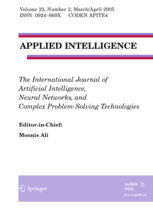
APPLIED INTELLIGENCE
Empowering the future with cutting-edge AI advancements.Applied Intelligence is a prominent peer-reviewed journal that has been instrumental in advancing the field of Artificial Intelligence since its inception in 1991. Published by Springer, a reputable name in academic publishing, the journal focuses on the innovative applications of intelligent systems, algorithms, and methodologies across various disciplines. With an impressive Q2 ranking in the Artificial Intelligence category for 2023, and a Scopus rank of #117 out of 350 in its field, Applied Intelligence is recognized for its significant contributions and rigorous standards. The journal is accessed primarily through subscription, ensuring that high-quality research reaches the academic community and industry professionals alike. Its commitment to disseminating cutting-edge research makes it an invaluable resource for researchers, practitioners, and students interested in the practical implications of AI advancements. Join a community dedicated to exploring the transformative power of artificial intelligence and stay ahead in this ever-evolving field!
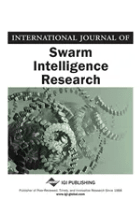
International Journal of Swarm Intelligence Research
Exploring the Frontiers of Swarm IntelligenceInternational Journal of Swarm Intelligence Research, published by IGI Global, stands at the forefront of research in the dynamic field of artificial intelligence, focusing specifically on swarm intelligence and its applications. With an ISSN of 1947-9263 and an E-ISSN of 1947-9271, this journal has carved a niche within academia since its inception, boasting a commendable Q3 rank in the categories of Artificial Intelligence, Computational Theory and Mathematics, and Computer Science Applications as of 2023. The journal spans vital research from the years 2017 to 2024, fostering an environment that welcomes innovative studies that apply natural systems principles to computational methodologies. Although not classified as Open Access, the journal remains accessible to a broad audience, providing vital insights and fostering discussion among researchers, professionals, and students delving into cutting-edge swarm intelligence topics. As such, this journal is an essential resource for those aiming to advance their understanding and application of these transformative technologies.
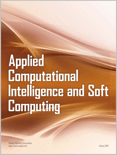
Applied Computational Intelligence and Soft Computing
Exploring the Synergy of AI and Soft ComputingApplied Computational Intelligence and Soft Computing, published by HINDAWI LTD, is a premier open access journal that has been disseminating critical research since 2009, focusing on the intersection of artificial intelligence and soft computing. With an impressive array of quartile rankings in 2023, including Q2 in Civil and Structural Engineering and Computational Mechanics, this journal has established itself as a significant contributor to the fields of computer science and engineering. Based in Egypt, it plays a vital role in advancing knowledge by providing researchers, professionals, and students with easy access to high-quality studies. The journal’s rigorous peer-review process ensures that only the most impactful research is highlighted, making it an essential resource for those looking to stay abreast of the latest innovations and methodological advancements in applied computational intelligence. Its Scopus rankings further affirm its influence and reputation within the academic community, exemplifying its commitment to facilitating collaboration and fostering intellectual discourse in various scientific domains.

Progress in Artificial Intelligence
Unveiling the Future of Artificial IntelligenceProgress in Artificial Intelligence is a leading journal published by SpringerNature, dedicated to advancing knowledge and research in the field of artificial intelligence. With a strong emphasis on the latest developments from 2012 through 2024, this journal enjoys a prominent position, holding a Q2 ranking in the prestigious Artificial Intelligence category for 2023, as well as achieving an impressive ranking of 64 out of 350 in the Computer Science - Artificial Intelligence category on Scopus, placing it in the 81st percentile. Progress in Artificial Intelligence serves as an essential platform for researchers, professionals, and students seeking to share innovative algorithms, applications, and theoretical advancements. Although it operates under a subscription model, its commitment to disseminating high-quality research and fostering collaboration in the AI community significantly contributes to the ongoing evolution of this exciting discipline.
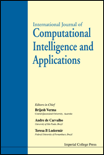
International Journal of Computational Intelligence and Applications
Transforming Ideas into Applications with Computational IntelligenceThe International Journal of Computational Intelligence and Applications, published by WORLD SCIENTIFIC PUBL CO PTE LTD, is a prominent journal dedicated to advancing the field of computational intelligence and its applications, with a keen focus on innovative methodologies and theoretical frameworks. With an impact factor reflective of its growing influence, the journal is classified in Q3 for Computer Science Applications and holds Q4 standings in both Software and Theoretical Computer Science as of 2023, showcasing its critical niche within these disciplines. Established in 2008 and converging through 2024, this journal serves as a vital resource for researchers, professionals, and students in Singapore and beyond, promoting scholarly communication and collaboration. Although it is a non-open access journal, it still provides a wealth of information that is readily accessible through institutional subscriptions and library resources. Researchers contributing to the journal benefit from its wide reach and dedicated readership, making it a substantial platform to disseminate groundbreaking research and insights.

International Journal of Fuzzy Logic and Intelligent Systems
Catalyzing Interdisciplinary Insights in Computational TheoryInternational Journal of Fuzzy Logic and Intelligent Systems, ISSN: 1598-2645, is a prestigious journal published by the Korean Institute of Intelligent Systems, dedicated to advancing the fields of Artificial Intelligence, Computational Theory and Mathematics, Computer Science Applications, Logic, and Signal Processing. Established to foster interdisciplinary research, this journal has quickly established its reputation, reaching a respectable Q3 quartile ranking across multiple categories in 2023. It serves as a vital resource for researchers, professionals, and students, offering insights into cutting-edge methodologies and innovative applications of fuzzy logic and intelligent systems. With a focus on disseminating high-quality research, the journal attracts contributions that drive the evolution of intelligent technologies and their practical implications. Published from South Korea, the journal is positioned to impact the global community, facilitating a deeper understanding of intelligent systems in various domains.

TWMS Journal of Applied and Engineering Mathematics
Bridging Theory and Practice in Mathematical SciencesTWMS Journal of Applied and Engineering Mathematics, published by TURKIC WORLD MATHEMATICAL SOC, is a distinguished open-access journal that has been contributing to the field of applied mathematics since 2011. With a focus on theoretical and practical applications spanning various areas including Computational Mathematics, Control and Optimization, and Numerical Analysis, this journal serves as a vital resource for researchers and professionals looking to disseminate and access quality research. Although currently positioned in the Q4 quartile across several mathematical categories in 2023, the journal aims to provide a platform for innovative research, fostering collaboration and knowledge sharing among scholars worldwide. Located in Turkey, this journal emphasizes accessible content, inviting a diverse audience to explore breakthroughs and advancements in mathematical sciences. With its broad spectrum of topics, TWMS Journal not only enriches academic discourse but also plays a crucial role in supporting the development of new methodologies and technologies in engineering and applied mathematics.
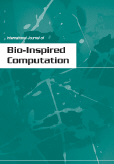
International Journal of Bio-Inspired Computation
Unlocking Nature's Secrets for Computational BreakthroughsInternational Journal of Bio-Inspired Computation, published by INDERSCIENCE ENTERPRISES LTD, is a leading platform dedicated to advancing research in the fields of bio-inspired computing and its applications. With a robust ISSN of 1758-0366 and E-ISSN of 1758-0374, this journal contributes significantly to the discourse in Computer Science, particularly emphasizing theoretical and practical frameworks that mirror natural processes. Situated in Switzerland, this peer-reviewed journal operates under a rigorous editorial process, ensuring high-quality publications that attract considerable attention, as evidenced by its placement in the Q2 category for 2023 in General Computer Science and Q3 in Theoretical Computer Science. With Scopus rankings reflecting its growing influence—ranked #62 out of 232 in General Computer Science and #36 out of 130 in Theoretical Computer Science—this journal invites researchers, professionals, and students to explore innovative methodologies and development in bio-inspired technologies. Although it currently does not adopt an open-access model, the journal remains committed to disseminating vital research that fuels advancements in computational intelligence, fostering collaboration and knowledge exchange in the ever-evolving landscape of computing.

Fuzzy Information and Engineering
Bridging Theory and Application in Fuzzy Information ScienceFuzzy Information and Engineering is a prestigious open access journal recognized for its contributions to the interdisciplinary fields of applied mathematics, control systems engineering, artificial intelligence, and information systems, published by TSINGHUA UNIVERSITY PRESS. With an impact factor that reflects its increasing influence, the journal has maintained a strong position in the academic community since its inception in 2011, converging its focus between 2014 and 2024. The journal is indexed in notable databases such as Scopus, demonstrating solid rankings across its categories, including a commendable Q3 classification in applied mathematics and control systems engineering. By fostering innovative research and disseminating key findings, Fuzzy Information and Engineering serves as a vital platform for researchers, professionals, and students alike, promoting advancements in fuzzy systems and their applications within diverse domains. Notably, since transitioning to an open access model in 2015, the journal has enhanced accessibility for a global audience, encouraging collaborative efforts in academia and industry.

Journal of Electrical Systems
Advancing Knowledge in Electrical and Computer SciencesThe Journal of Electrical Systems is a prominent Open Access journal published by the ENGINEERING & SCIENTIFIC RESEARCH GROUPS since 2005, dedicated to presenting valuable research in the realms of Electrical and Electronic Engineering as well as Computer Science. With an ISSN of 1112-5209 and an E-ISSN of 1112-5209, this journal seeks to foster innovation and share knowledge among researchers and practitioners operating in these critical fields. Operating out of Paris, France, the journal has made significant strides despite recent categorizations placing it in the Q4 quartile of Computer Science and Electrical and Electronic Engineering. Its ongoing commitment to disseminating impactful findings is underscored by its open accessibility, enabling a wider audience to engage with research that spans various interdisciplinary applications. The journal continuously invites contributions that enhance our understanding of electrical systems, empowering stakeholders at all levels to push the boundaries of technology and engineering.